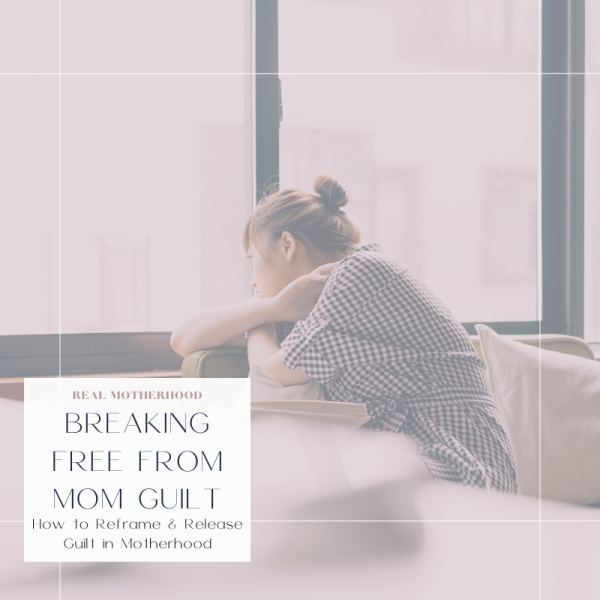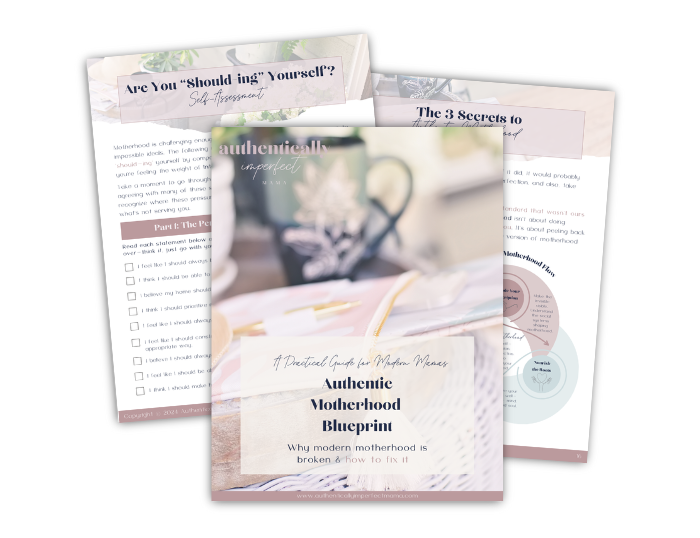Motherhood is a journey filled with joy, love, and, let’s be honest, a considerable amount of guilt. That nagging voice questioning whether you’re doing enough, being enough, or sacrificing enough is all too familiar. Whether it’s the guilt over working too much (or too little), the pressure to create Pinterest-perfect memories or the self-doubt that creeps in after every tough parenting moment, mom guilt feels like an unavoidable part of the job.
But what if I told you that this “mom guilt” isn’t a personal failing but a societal construct designed to keep mothers striving for an unattainable ideal? What if, instead of trying to “just let it go,” we could understand where it comes from and use it as a tool for growth instead of shame?
In this post, we’ll take a deep dive into:
- Why mom guilt isn’t about you – it’s about the impossible script mothers are given.
- The Perfect Mother Myth and how it sets us up to fail.
- The truth about intensive mothering and why it leads to burnout.
- How to reframe guilt as a guide instead of a burden.
- Practical steps to challenge guilt and reclaim your confidence in motherhood.
The perfect mother myth: unveiling the illusion
I will never forget my son’s first birthday during the pandemic. I had dreamed of throwing a big, beautiful party with decorations and a themed cake that would make Pinterest proud. But with lockdowns in place, all of that was impossible.
To make up for it, I went all in on a small party of four (plus Zoom guests). I meticulously planned every detail: the perfect cake, custom decorations, and a milestone banner. I convinced myself that if I could make it special enough, the absence of family and friends wouldn’t be felt.
The reality? I spend the entire day stressed, snapping at my husband over a cake pick-up mishap, and feeling too anxious to actually enjoy the moment. My son, meanwhile, couldn’t have cared less about the decorations. He was perfectly happy crawling around the deck, playing with the wrapping paper.
Looking back, I realize that my guilt over not being able to provide the “perfect” experience wasn’t actually about my son. It was about me. I had internalized the belief that a “good mom” should create magical, picture-perfect moments for her child, regardless of the circumstances circumstances.
This is the Perfect Mother Myth at work. Society has long perpetuated the idea that “good moms” should be endlessly selfless, fully devoted to their children, and able to juggle everything flawlessly. This unattainable ideal sets us up to fail and then convinces us that it’s our fault when we do.
Dr. Sophie Brock, a motherhood studies sociologist, emphasizes that mom guilt doesn’t come from failing as a mother; it comes from trying to meet an impossible standard. Understanding that the Perfect Mother Myth has given us a false narrative to use as a measuring stick is the first step in breaking free from mom guilt.
Intensive mothering ideology: The Pressure to do it all
Closely tied to the Perfect Mother Myth is the concept of intensive mothering, a term coined by sociologist Sharon Hays. This ideology dictates that:
- Mothers should be the primary caregivers, investing extensive time, energy, and resources into child-rearing
- Motherhood should be all-consuming
- Anything less than total devotion is inadequate
Research indicates that this intensive approach is not only unrealistic but also contributes significantly to maternal guilt and burnout. Mothers are often left feeling that they must meet these high standards without adequate societal support, leading to a cycle of guilt and exhaustion.
This ideology is also why we feel guilty when we do anything for ourselves, why we feel pressure to “make every moment count,” and why self-care is framed as both essential and indulgent in modern motherhood.
I remember the first time I left my kids for a solo trip to Target (literally to buy toothpaste). My twins were just a few months old, and I hadn’t had a moment alone in weeks. I walked into the store, took a deep breath, and immediately felt like I needed to hurry home.
Why? Because I had convinced myself that I should want to be with my children all the time, that I was the only one who could care for them correctly, and that taking time for myself was somehow selfish. Even though I logically knew that a 30-minute trip to Target wouldn’t ruin their childhood, my guilt was real.
This is what intensive mothering does: it conditions us to believe that any separation from our children is unnatural, even when we desperately need it.
reframing mom guilt as growth
Instead of trying to “just let it go,” we need to understand what our guilt is really telling us. Dr. Sophie Brock (2022) teaches that guilt can be a guide-but only if we learn to interrogate it instead of absorbing it.
Before you accept guilt as truth, ask yourself:
- Is this guilt coming from my personal values or societal expectations?
- Does this guilt align with what actually matters to me, or am I internalizing a “should” from the Perfect Mother Myth?
- Is this guilt helping me make a meaningful change or just making me feel bad?
authentic motherhood blueprint
FREE DOWNLOAD!
The Authentic Motherhood Blueprint helps you uncover where unrealistic expectations come from, break free from the pressure to be the “perfect mom,” and create a motherhood experience that aligns with your values.
Embracing the "Good enough" mother
Somewhere along the way, we were sold the idea that a “good mother” goes the extra mile—creating the perfect activities, ensuring every meal is organic and homemade, and keeping the house spotless while fostering a deep emotional connection with our kids. But what if I told you that “good enough” is actually better?
I unintentionally learned this when my kids were toddlers. I spent hours researching the best developmentally appropriate toys and obsessively checking influencers’ toy lists. I concluded that my kids needed toys that stimulated their fine motor skills, encouraged sensory exploration, and promoted cognitive development. I carefully selected, unboxed, and set them up in the playroom, waiting for the magic to happen.
And it wasn’t the beautifully crafted, Montessori-inspired wooden puzzles they played with the longest. No, it was the cardboard box it all came in.
All the effort, all the stress, and all the pressure I had placed on myself to “do it right” didn’t matter. My kids didn’t care about the perfect, research-backed toys-they cared about connection, play, and imagination. The cardboard box was “good enough” for them.
The concept of the “good enough” mother, introduced by renowned psychoanalyst Donald Winnicott, suggests that mothers don’t need to be perfect; they just need to be “good enough” to meet their children’s needs. They need a mother who is present, responsive, and loving (Winnicott, 1953). This perspective allows children to develop resilience and independence while relieving mothers from the pressure of perfection; thus creating space for joy, connection, and a version of motherhood that actually works for us.
Your child will never look back and wish you had done more Pinterest crafts. They will remember how you made them feel, and that’s always enough.
Practical steps to challenge mom guilt
Step 1: Identify Where the Guilt Comes From
Ask yourself: Would I feel guilty about this if I didn’t see it all over social media?
Step 2: Reframe the Thought
Instead of “I feel guilty for taking time for myself,” try “Taking care of myself is taking care of my family.”
Step 3: Set Boundaries with Compassion
It’s okay to say no. Your kids don’t need a perfect mother—they need a present one.
Step 4: Surround Yourself with the Right Support
Find a community that validates real motherhood—not one that reinforces impossible standards.
Step 5: Remember That Good Enough Is Enough
Your kids don’t need perfection. They need you as you are.
Redefining motherhood on your terms
Breaking free from mom guilt means challenging who gets to define what a “good mother” looks like. It’s about acknowledging the systemic structures that contribute to these feelings and advocating for change, both personally and collectively.
Remember, your worth as a mother isn’t measured by how much you sacrifice but by the love, care, and presence you bring to your child’s life. By challenging these myths and embracing your authentic self, you liberate yourself from guilt and set a powerful example for your children.
TL;DR...
Mom guilt isn’t a sign that you’re failing—it’s a symptom of societal expectations that set moms up for failure. The Perfect Mother Myth (O’Reilly, 2010) and intensive mothering ideology (Hays, 1996) push the idea that moms should sacrifice everything for their children, leaving many feeling guilty no matter what they do.
Instead of trying to “just let it go,” we need to reframe guilt as a guide. Ask yourself: Is this guilt coming from my values or from unrealistic expectations? By recognizing where guilt comes from, challenging the impossible standards of motherhood, and prioritizing self-compassion, we can begin to break free from burnout and self-doubt.
You don’t need to be perfect to be a great mom. Your worth isn’t measured by how much you sacrifice. Let’s rewrite the narrative—on our own terms.
Sources:
Brock, S. (2022). Motherhood Studies Practitioner Program. Dr. Sophie Brock. Retrieved from https://drsophiebrock.com
Hays, S. (1996). The Cultural Contradictions of Motherhood. Yale University Press.
O’Reilly, A. (2010). Matricentric Feminism: Theory, Activism, and Practice. Demeter Press.
Winnicott, D. W. (1953). Transitional Objects and Transitional Phenomena – A Study of the First Not-Me Possession. The International Journal of Psychoanalysis, 34, 89-97.
PubMed. (2021). Maternal Guilt and Intensive Parenting: How Societal Pressures Contribute to Mom Burnout. Retrieved from https://pubmed.ncbi.nlm.nih.gov/33600296




